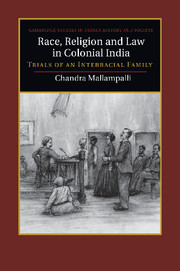Book contents
2 - Embodying “Dora-hood”
The Brothers and Their Business
Published online by Cambridge University Press: 05 December 2011
Summary
I knew the Pedda Dora (Matthew Abraham). I knew his father.
– Testimony of Plaintiff’s forty-fourth witness, Timmanah, son of Nursapah, caste Sackla, a washerman by occupation, and residing at Bellary. January 15, 1858.At the peak of their business, Matthew and Francis were referred to as “Pedda and Chinna (older and younger) Dora.” As an honorific and masculine designation, the term dora was used before the arrival of the British to designate a landholder, a local big man, or someone of social prominence. Within Tamil society, the title of dora (from the Tamil, dorai), conferred respect to a person holding higher rank or official status. Under colonialism, the term came increasingly to be associated with “whiteness” or the imitation of Europeans. It could refer to a gentleman (Indian or European) or more pejoratively to a lower-caste person who adopted European clothes and customs to elevate his social status. The multiple meanings attached to this term (which could also be rendered doray or thoray) reveal both European and local cultural influences in Bellary.
- Type
- Chapter
- Information
- Race, Religion and Law in Colonial IndiaTrials of an Interracial Family, pp. 51 - 78Publisher: Cambridge University PressPrint publication year: 2011



